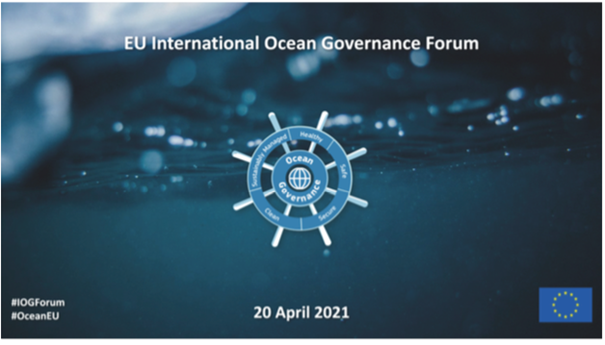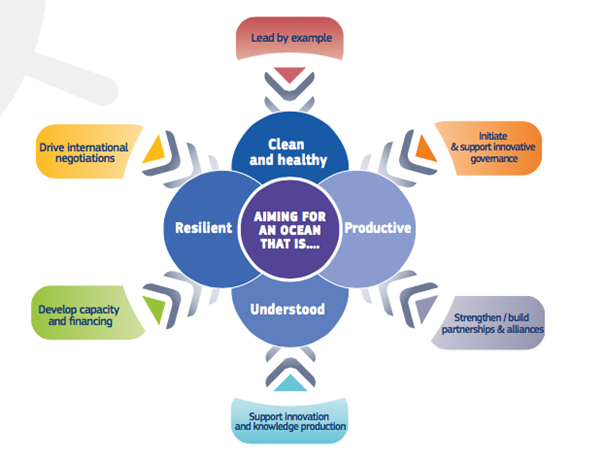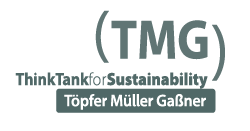The EU has what it takes to ramp up global ambition on oceans and climate
3rd International Ocean Governance Forum lays agenda for transformative Blue Economy pathways
by Wangu Mwangi and Harry Stopes | 2021-04-26
Oceans constitute a blind spot in an otherwise ambitious EU environmental agenda, as exemplified by the EU Green Deal setting out the transition to climate-neutrality by 2050, or the EU Biodiversity Strategy 2030. Yet the region has the vision and resources to “lead by example” by championing a coherent and transformative global agenda on clean oceans.
The EU’s role in driving stronger multilateral collaboration to achieve progress on key issues, including marine pollution, fisheries, deep-sea mining and other destructive practices, was high on the agenda of the 3rd International Ocean Governance Forum (IOG Forum). Held on 20th April 2021, the online event drew more than 640 audience members to view an impressive line-up of EU and global leaders to discussing their vision for an ocean that is “clean and healthy, resilient, productive, and understood.

The title screen for the IOG forum 20 april 2021.
Linking national and regional agendas
In opening remarks, Virginijus Sinkevičius, European Commissioner, Environment Oceans and Fisheries, acknowledged that there is “a state of emergency for our oceans.” He welcomed the “clear message” emerging that member states need to take action individually, but also need effective, collaborative, international governance. Commissioner Sinkevičius assured participants that the Commission would take on board the recommendations of the Forum in updating the EU’s strategy.
John Kerry, US Special Presidential Envoy for Climate, signalled his country’s renewed commitment to play a greater role in global environmental diplomacy, underscoring the urgent need to link actions on climate and the oceans, and stressing that the world is not currently even close to meeting the Paris targets. He outlined some key actions for getting us on the path to a “climate-resilient, biodiverse, and carbon-free future,” highlighting his wish for “a new global goal covering 100% of the ocean.”
Forum Moderator Alexander Müller, Managing Director, TMG-Think Tank for Sustainability, challenged the assembled leaders to offer concrete solutions to address global challenges, and help scale up current actions beyond the national and regional (EU) level to transform the global ocean governance agenda. Citing the example of marine spatial planning, he noted that this critical approach for supporting the sustainable use of marine resources without jeopardising the long-term sustainability of marine ecosystems has so far mostly taken place within national borders.
Picking up on this theme, Aboud Jumbe, Principal Secretary, Ministry of Blue Economy and Fisheries, Zanzibar, described marine litter as a central issue for his country, noting the need for cross-border collaboration in the Western Indian Ocean region to support key policy priorities, including linking ocean governance and climate adaptation, promoting sustainable value chains, and strengthening maritime safety and security.
What stakeholders expect of the EU
Representatives of scientific institutions and think tanks involved in the global consultations highlighted key insights from the process, and recommendations for EU leadership on oceans and climate. The recommendations are outlined in the IOG Forum report, titled, ‘Setting the Course for a Sustainable Blue Planet: Recommendations for Enhancing EU Action.’

Source: ‘Setting the Course for a Sustainable Blue Planet: Recommendations for Enhancing EU Action’, EU International Ocean Governance Forum
Source: ‘Setting the Course for a Sustainable Blue Planet: Recommendations for Enhancing EU Action’, EU International Ocean Governance Forum The report underscores the importance of linking this EU initiative to the global oceans agenda, including under the UN Convention on the Law of the Sea (UNCLOS), and ongoing negotiations for an international legally-binding instrument for the conservation and sustainable use of marine biological diversity of areas beyond national jurisdiction (BBNJ). It also highlights opportunities to enhance synergies with the 2030 Agenda on Sustainable Development, the proposed post-2020 Global Biodiversity Framework, and the newly launched UN Decades on Ocean Science for Sustainable Development, and Ecosystem Restoration.
Some specific targets and actions envisaged in the report include:
Develop a global strategy for the conservation, restoration and sustainable use of marine ecosystems, including protecting at least 30% of the ocean in designated Marine Protected Areas by 2030.
Adopt a zero marine pollution strategy, covering pollutants from both sea and land-based activities, such as shipping waste and plastics.
Promote the development, adoption and application of common environmental and social standards for all blue economy sectors. Strengthen fisheries governance, and support countries with less capacity to enforce existing instruments.
Adopt a ‘whole of ocean approach’ to climate change, including the agreement of nature-based ocean solutions as part of the Nationally Determined Contributions of Member States under the Paris Agreement.
Increase the allocation of financial resources to resilience-enhancing strategies, possibly including an ‘Ocean Bank’ to direct funding.
Lead by example in developing transdisciplinary collaborations that support the knowledge base necessary to underpin international ocean governance.

Session presenting the IOG Forum recommendations on 20 April 2021: Alexander Müller, MD, TMG-Think Tank for Sustainability and IOG Forum Moderator; Pierre Strosser, Head, ACTeon; Sebastian Unger, Ocean Governance Lead, Institute for Advanced Sustainability Studies/TMG; and Sheila Heymans, Executive Director, European Marine Board.
Session presenting the IOG Forum recommendations: Alexander Müller, MD, TMG-Think Tank for Sustainability and IOG Forum Moderator; Pierre Strosser, Head, ACTeon; Sebastian Unger, Ocean Governance Lead, Institute for Advanced Sustainability Studies/TMG; and Sheila Heymans, Executive Director, European Marine Board.
Organised around two panel discussions, the rest of the session highlighted some entry points for translating EU leadership at key multilateral processes, including the ongong BBNJ discussions, upcoming UN Conferences of the Parties on climate (COP26) and biodiversity (COP 15), and global initiatives to eradicate plastic pollution and marine litter, spearheaded by the UN Environment Assembly.
Are we steering the right course?
This panel provided perspectives on, among other questions: how to pursue a global zero pollution strategy to protect marine species and ecosystems; insights on how to tackle unsustainable fishing and other enabling conditions for building a sustainable blue economy. Speakers expressed concern that not only are fish stocks threatened by illegal, unregulated and unreported fishing, but subsidies for the sector are effectively aiding their destruction “to the tune of billions.” The EU’s leadership in open data and data privacy, as well as its investments in the Copernicus programme and other monitoring initiatives are one area where it can demonstrate strong leadership in enhancing coherent approaches to ocean monitoring and governance. The panel also called for renewed efforts to reach agreement on marine pollution, including through new global instruments addressing the full lifecycle of plastics, and to reduce shipping speed and noise. Panelists were Sigrid Lüber, President and founder, Ocean Care; Charlotte de Fontaubert, Global Lead for Blue Economy, World Bank; Nadia Pinardi, University of Bologna; Jakob Granit, Director General, Swedish Agency for Marine and Water Management; and Amadou Tall, Team Leader PESCAO Component 1.
All hands on deck: towards transformative global oceans governance
In the final session senior staff from six different EU Directorate Generals addressed issues including: how to achieve maritime spatial planning beyond areas of national jurisdiction; the ocean governance structures and mechanisms required to develop maritime protected areas; the ways that international partnerships can support sustainable fisheries management; how scientific research can strengthen ocean governance and how the EU can support this research. Echoing a point made several times throughout the forum, speakers emphasised that progress on biodiversity, climate and livelihoods could and should be simultaneous, rather than being treated as a zero-sum game. “We can only properly advance if we advance on all elements,” one speaker remarked. Such progress, the panel argued, would require coordinated monitoring and knowledge-exchange. This in turn requires the building of robust international alliances between EU member states, and between the EU and actors around the world. Panelists were Charlina Vitcheva, Directorate General for Maritime Affairs and Fisheries; Veronica Manfredi, Directorate General for Environment; Koen Doens, Directorate General for International Partnerships; John Bell, Directorate, Healthy Planet; Matthias Petschke, Directorate General for Defence Industry and Space; and Magda Kopczynska, Directorate General for Mobility and Transport.
“Oceans,” as one speaker noted, “are the unacknowledged regulators of much our planetary systems. Systemic risk needs systemic transformation.” In this context, change is urgent but, once achieved, promises enormous benefits. A recording of the International Ocean Governance Forum can be watched here, and the report downloaded here.
 Urban Food FuturesFeb 09, 2026
Urban Food FuturesFeb 09, 2026Pushing the horizon: Urban farming and community-led innovation in Mukuru informal settlement
A small community-run greenhouse in Mukuru is offering insights into how controlled-environment agriculture can strengthen food security in urban environments under increasing pressure—and a look into the future of food systems in informal settlements.
Christian Sonntag, Emmanuel Atamba, Lumi Youm
 Land GovernanceDec 18, 2025
Land GovernanceDec 18, 2025Land tenure, women’s land rights, and resilience: Reflections from CRIC23 toward UNCCD COP17
Our experts discuss what the exchanges at CRIC23 highlighted and revealed about the role of secure and gender-equitable land tenure in the UNCCD's work ahead of the 2026 triple COP year.
Frederike Klümper, Washe Kazungu
 Urban Food FuturesDec 09, 2025
Urban Food FuturesDec 09, 2025The story of Mukuru's Urban Nutrition Hub
In Mukuru informal settlement, a safe haven for women has grown into the Urban Nutrition Hub, a multi-purpose space for nutrition education, training, and community development, demonstrating the potential of grassroots community-owned innovation..
Serah Kiragu-Wissler


